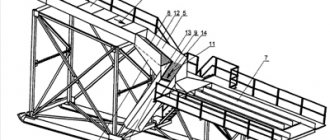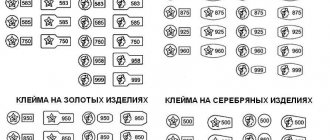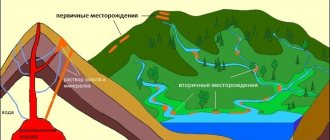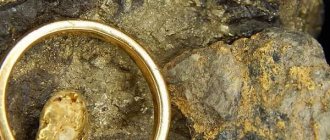Gold is a precious metal, the basis of the financial system of all humanity and any individual country at almost all times. That is why gold mining has been the most important activity from ancient times to our time.
Today gold mining in Russia is carried out by individuals; a license for this type of activity is required. However, this area has undergone many changes.
Gold mining in Russia today and in the past
In our country, it is officially believed that gold mining in Russia by private individuals, the discovery of mines, and the activities of entire corporations have been carried out on an industrial scale since the 18th century. It is obvious that gold was mined in small quantities in previous centuries. And this is no coincidence. Nature has provided Russia with many rich alluvial deposits available for development in almost all parts of the country.
Modern Russia is one of the leaders in gold mining. Gold is found in all parts of the country. Since the Middle Ages, the Urals, Siberia, the Far East, etc. have been famous. There is gold in closer regions, although in smaller quantities - in the Moscow region, Leningrad region. Gold production in Russia at the present stage is more than 250 tons per year. Based on the results of last year, our country has secured one of the leading positions in the overall production of precious metals.
Main gold mines and deposits in Russia
If the practice of private gold mining gives a positive result, the question will arise about its distribution throughout the country, fortunately, there are plenty of promising places. Most of the richest mines in Russia have been developed for decades, and some deposits have a history of one and a half centuries, but the gold reserves in them show no signs of drying up.
The most famous of them:
- Solovyovsky mine, Amur region;
- Udeysky mine, Krasnoyarsk region;
- Nevyanovsky mine, Ural ridge;
- Gradsky mine, Chelyabinsk region;
- Dambuki field, Amur region;
- Conder, Khabarovsk Territory;
- Altai mine.
Developed fields
There are thousands of places in the Russian Federation where you can find gold. In 15 regions, mining is carried out on an industrial scale. Another 10 regions are characterized by variable gold production volumes. Most of the deposits being developed are secondary (alluvial). In terms of the number of large alluvial gold mines, Russia ranks first in the world.
Stockwork deposits
Such deposits contain excess sulfides and quartz. Gold inclusions look like thin veins, and the gold-bearing layer itself occupies a large area and stretches for tens of kilometers in length. These mines, with a relatively low content of noble metal, are quite suitable for open-pit mining.
Forms of activity of gold miners
The field of activity of active and energetic people has always been vast and varied. Gold mining, although dangerous at times, does not necessarily require a high-tech base and large financial resources. Gold mining can be carried out by individuals, large firms, and government agencies. At the same time, the Russian state either took an active role in gold mining or outsourced gold mining in Russia to individuals. At the present stage, corporations such as Kinross Gold, OJSC Yuzhuralzoloto, OJSC Severstal, etc. are mainly involved in gold. Until recently, gold mining in Russia by individuals was practiced in much smaller volumes.
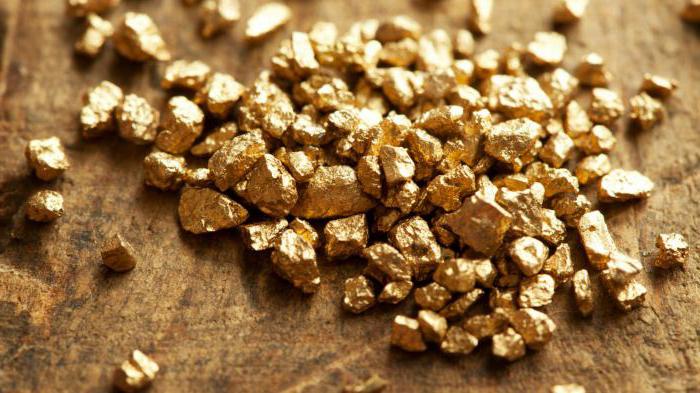
Russians may be allowed to independently mine gold and amber
A separate law will be created for prospectors regulating their right to personally extract precious minerals from the subsoil, including gold, silver and amber. This will be one of the ways to balance the development of the country’s regions, as follows from the Government’s legislative work plan for 2021, published on January 10.
The executive authorities are also preparing to create a new budget code, establish standard design in the country, introduce new benefits for small businesses and return betting advertising to the air. In total, over the course of the year, the Cabinet of Ministers plans to develop 153 bills designed to accelerate the growth and digitalization of the economy and generally improve the quality of life of the population.
Legislative clock reconciliation
The Cabinet's legislative work plan is a list of titles of bills that individual ministries and departments must submit to the Government during the year. Some of the documents are planned to be submitted to the State Duma this year, and some will be submitted to parliament for consideration in 2022.
Olga Savastyanova , head of the State Duma Committee on Control and Regulations, told the Parliamentary Newspaper.
. “It would be strange if we were like a street with parallel traffic. Still, behind this plan there are issues that concern our citizens,” she added.
The government plans to develop 153 bills in 2021
According to the deputy, Parliament and the Government actively and fruitfully interact in terms of legislative work. This was shown especially clearly in 2021: during the pandemic, it was necessary to quickly make decisions and also quickly adjust accepted standards.
It was also possible to solve the long-standing problem of untimely preparation of by-laws and sending opinions on legislative initiatives of deputies. A lot of joint work is being carried out as part of the implementation of the President's Messages to the Federal Assembly: a special working group in the State Duma forms a work plan, which notes what laws need to be adopted, and it is necessarily agreed upon with the Government. “Because they take on some issues, and we take on some. This is a kind of legislative reconciliation of clocks,” Savastyanova clarified.
That the coming year
The Government's legislative plan for 2021 consists of several thematic blocks. One of them presents a list of future laws to balance regional development. For this purpose, for example, the improvement of the Far Eastern Hectare program will continue. Another noteworthy task is for the Ministry of Eastern Development to create a package of bills on mining activities. We are talking about citizens’ independent extraction of gold, silver, amber and other valuable minerals in hard-to-reach places. Apparently, Russians will be allowed to mine even on the continental shelf in the Arctic and Pacific oceans. The documents should arrive at the State Duma in November, simultaneously with the Ministry of Finance’s project to introduce a separate tax for miners.
Most of the planned bills amend existing norms, but there are also plans for completely new documents. Of these, the most ambitious is the new edition of the budget code, which the Ministry of Finance has been working on for two years. It is planned to submit the document to the Government in October, and it will be submitted to parliamentarians in January next year. In addition, during the year new laws will be developed on automobile and urban ground-based electric transport, on the probation system, as well as on remote sensing of the Earth from space.
Passivity of private gold mining
Reasons that contributed to the passivity of free miners:
- Technical. In the modern technological world, gold is mined primarily during the daily activities of mining and processing plants and individual special machines - dredges. Industrial gold mining is much more efficient; manual labor cannot be compared with machine labor.
- Legal. Even in modern times, the state has for a long time limited the activities of small non-governmental organizations and individuals. Until recent years, the law openly sided with large companies.
Reasons for the continued work of private gold miners
Nevertheless, technical and legal restrictions could not and cannot stop private gold miners. Firstly, not all deposits are suitable for industrial development. Some of them are simply unprofitable - their cost due to relief, geographical and economic conditions is higher than the cost of the production obtained. Large enterprises will not deal with gold in this case. Gold mining in Russia by individuals in small shares is more relevant than large-scale mining. There are many deposits with a small concentration of precious metal; the state not only cannot control them, but sometimes it is not even able to register them. At the beginning of the 21st century, small deposits of gold are being discovered even in regions that have never panned for gold.
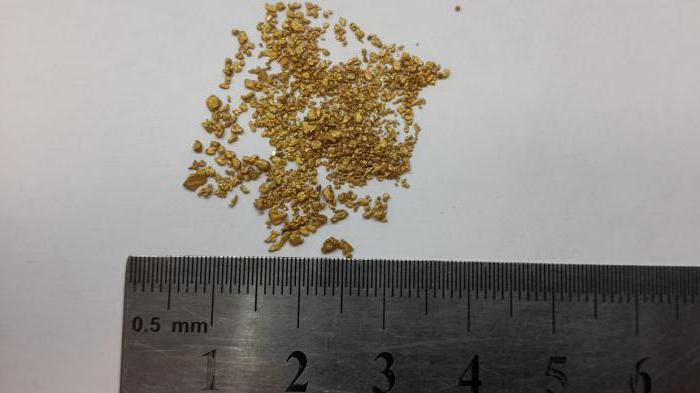
Secondly, gold laundering by unorganized miners in abandoned deposits undoubtedly has positive aspects: a “web” of road routes to mining sites, low demands on the professional level of workers, and the potential for using more primitive, inexpensive tools. There is an officially non-operating field in the Amur region. The search for gold went on there for more than a hundred years. However, a large volume of precious metal was raised from the ground, so free miners will find something to look for. Gold mining in Russia by private individuals in abandoned mines is currently increasing.
History of private gold mining during the USSR
A definite problem is the lack of significant experience in private gold mining. Gold mining in Russia by individuals has not been permitted since 1954. The Stalin era was freer. The state included additional payments for gold miners and gave them the right to develop the richest gold mines. To intensify labor, they distributed housing, vouchers to sanatoriums, etc. Before the Great Patriotic War, every resident of the country over 18 years of age who had not previously received a criminal punishment had the right to work as a miner. The number of gold miners operating separately or in non-governmental organizations reached 120 thousand.
The resulting gold was handed over to countless specialized points. Gold mining in Russia at mines by private individuals, their discovery has brought significant benefits. Then the deposits became state owned. The precious metal in Russia was mainly obtained in the east: in the Urals, in Siberia, where the Bolsheviks did not immediately find themselves after the revolution. Gold mining enterprises found themselves in the hands of one political force, then another. The losers, when leaving, destroyed equipment, disabled mines, and did not allow workers to function.
How to get a license
Even if you have the necessary funds, obtaining a license for such activities is not so easy. Rosnedra announces an auction for the development of strictly defined deposits.
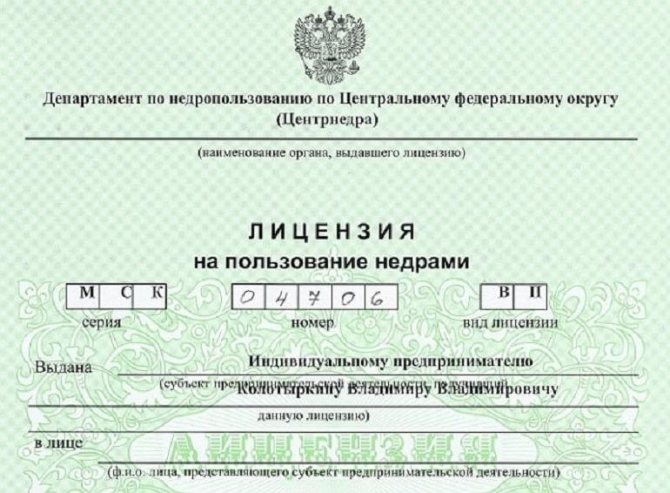
Individuals can also contact Rosnedra and receive one of the sites for development, a full list of which is publicly available. At the moment, there are already about a hundred such sites.
Required documents for individuals and individual entrepreneurs
To obtain a license, you must obtain the status of an individual entrepreneur; for this you will need:
- Application for registration in the prescribed form;
- Copy of the passport;
- Receipt for payment of state duty.
Procedure for obtaining permission
After registering an individual entrepreneur, an individual can submit an application for the corresponding plot. The decision to grant a license is made within 30 days.
Upon receipt of a license, an individual entrepreneur is required to register with the tax office as a payer of mineral extraction tax.
Approximate cost of LDZ
The cost of a license for a non-resident is from 5 billion rubles. The price for domestic companies is lower, but is also expressed in significant numbers, depending on the results of the auction.
Law firms offer intermediary services for obtaining licenses for the extraction of valuable metals, estimating their assistance at 100-200 thousand rubles.
Pitfalls of legislation
It is impossible to choose a plot of land somewhere in the Sverdlovsk region or Karelia. The law applies exclusively to the territory of the Magadan region. Mining by individuals in Russia is allowed only by the surface method without the use of any equipment other than hand tools. The use of hired workers is also prohibited.
How to save money
The main way to avoid additional expenses is to do the paperwork yourself, without resorting to the services of intermediaries. Longer and more troublesome, but cheaper.
For legal entities, a way to reduce costs is to participate in a competition. The state, acting as a customer, puts forward a number of demands, but the absence of tenders allows reducing the costs of organizing gold mining.
The Decline of Private Gold Mining during the Civil War
During the Civil War, gold mining was almost completely put out of action. If on the eve of the revolution gold mining in the country decreased, then with the beginning of the civil confrontation it fell even more. In 1918, a total of 30 tons of gold were mined, and on the eve of the war the total mass was 64 tons per year. There was no private gold mining law (or any other gold mining law).
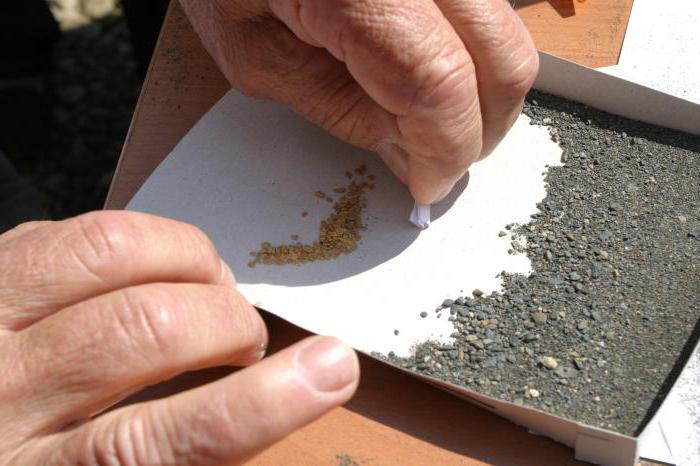
In subsequent years, they received less and less gold. In 1920, 2.8 tons were mined, and in 1921, only 2.5 tons. However, during the years of the existence of free miners (1932-1941), the volume of precious metal obtained increased several times.
As already noted, in 1954, by decision of the Soviet state, the work of free miners in the extraction of precious metal was prohibited. After the collapse of the USSR, the illegal production of precious metals annually amounted to about 15-20 tons - 10% of the legal volume.
Contents and cost of the license
If you are, after all, a private entrepreneur and have received such a necessary document, this means that you have the right to 20 years, during which you can mine precious metals and stones on an agreed plot of land. If you also have plans to engage in geological exploration there, then another 5 years will be added to the period of 20 years. Total - 25 years to experience the craft of a miner.
In the case of private gold mining, everything is a little less rosy - only 5 years are given. You will have 15 acres of work space, which will have to be processed almost manually, with a metal detector, since the use of heavy equipment, and simply attracting additional workers for individual entrepreneurs, is prohibited. Diving to a depth of more than 5 meters is also prohibited. There is also a regulation on the mass of gold mined - up to ten kilograms.
Modern times
In recent decades, some changes in the field of gold mining have occurred. Against the backdrop of ongoing changes at the present stage, strict restrictions in gold mining do not seem entirely logical and understandable. Gold mining in Russia by individuals required a license. Gold mining and its licensing are limited by the Federal Law “On Subsoil” No. 2395-1, which was included in those in force in the first year of the existence of the Russian state, and the Federal Law “On Precious Metals and Precious Stones” No. 41-FZ, put into effect in 1998 .
The law on gold mining in Russia by individuals provides that the extraction of gold is carried out only by legal entities who have taken permission (license). The government agency distributing licenses is the Federal Agency for Subsoil Use - Rosnedra and its organizations in the provinces. A permit is required for gold mining in Russia by individuals.
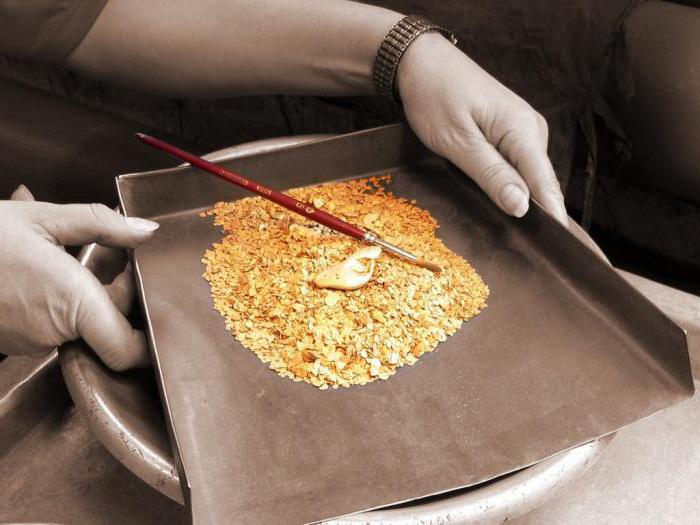
On the eve of the gold rush
As already mentioned, a number of additions were made to the Russian “Law on Subsoil”, as a result of which ordinary citizens of the Russian Federation can obtain a license for gold mining. Why was this done? First of all, as official sources say, in fulfillment of the Constitution of the state, which clearly states that the wealth of the country belongs to its people. A certain social factor also played a role, namely, the standard of living of the country’s citizens in some of its regions. In particular – Chukotka.
Cut off from the ability to mine gold on their own, and in the absence of a sufficient number of jobs in the area, local residents clearly experienced financial difficulties. The new amendment will allow any local to start their own micro-business, increase personal income, and even replenish the state’s gold reserves for a decent remuneration.
Obtaining a gold mining license
The instructions for obtaining a permit consist of the following mandatory steps:
- Exploration of an area whose subsoil is recommended by the state for sale at an auction or competition (such information is available on the Internet on government websites, all messages are publicly available on the website of Rosnedra and regional branches).
- Submitting a requirement to participate in a public auction or competition, obtaining a number of official documents determined by the competitive (auction) conditions.
- The participant who receives first place in the bidding (auction) will win a gold mining license.
As a rule, gold mining in Russia by individuals (a license is required) is permitted for 20-25 years or for the period of completed gold production at the mine. A document can be officially recognized from the moment of state registration.
In our country from 1992 to 1998. Any residents of Russia received permission to explore this precious metal even without the proper official document from the state structure. Since 1998, free miners have lost many rights: they could only work in organizations that have obtained gold mining licenses. In particular, gold mining in Russia is now carried out by individuals with a license.
Gold mining license
A license for gold mining in Russia is issued only to legal entities. Individuals are prohibited from extracting metal from the subsoil. This is stated in Article 191 of the country’s Criminal Code. Before receiving the document, you need to register an LLC or OJSC.
This is how articles devoted to gold mining in the country began until 2016. Now, individual entrepreneurs can also extract metal from the subsoil. Changes were made to the subsoil legislation at the initiative of Dmitry Medvedev.
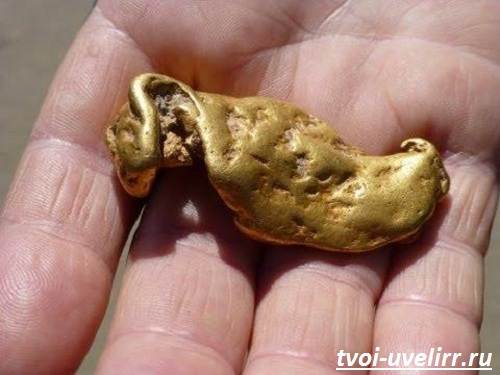
The impetus for the amendments was the plight of the residents of Chukotka. The fishery that fed many people turned out to be inaccessible. There are only a few large organizations, and ordinary citizens of the region, that is, the majority, need to survive. The ban has been lifted. All that remains is to figure out who to contact to obtain gold mining licenses .
Who issues a license for gold mining
The subsoil from which metal is extracted by organizations, private companies, or state-owned companies. Therefore, the issuance of licenses for land use is entrusted to the federal body - Rosnedra.
It has regional offices and authorized assistants, for example, Tsentrsibnedra. This geology and licensing department deals with the documentation of Buryatzoloto.
Sometimes the country's Ministry of Nature gets involved. It is responsible for auctions for the right to develop particularly important deposits. So, in 2016, the Ministry of Natural Resources will decide the fate of Sukhoi Log. The largest gold deposits in Russia were discovered in the Bodaibinsky district of the Irkutsk region.
The corporations Druza, Rostec, and Vysochaishy volunteered to participate in the auction. Foreign companies (even partially) were denied access to trading by the Ministry of Nature. Their starting amount is 5 billion rubles.
The standard fee for a license obtained from Rosnedra is significantly less. But more on this in the chapter on prices. In the meantime, let’s find out how to get around getting permission from the party.
avoid having to think about obtaining a gold mining license by purchasing a company that already has all the necessary papers. For example, an enterprise for the extraction of precious metals and sands is for sale. The enrichment plant, where valuable material is selected and primary processing is carried out, has already been built.
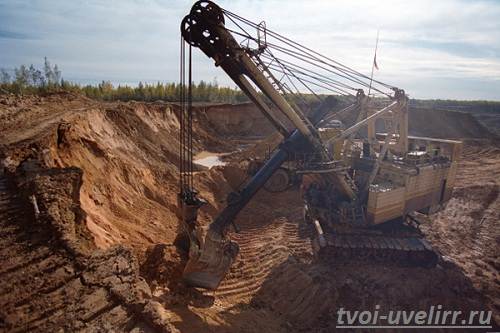
The license was issued to the organization until 2020. All that remains is to take over the business. Renewing a permit is usually easier than getting one for the first time. One of the snags is that geological information about the subsoil site must undergo state verification. Experts will evaluate the reserves. The papers will not be issued until their verdict.
Some businessmen do not buy existing enterprises, but start by concluding agreements with their owners. The papers allow the development of part or the entire territory of the deposit. At the same time, the license to conduct gold mining remains with the owner of the mine.
Concluding agreements with other legal entities and transferring to them powers to develop subsoil resources are not prohibited by law. The relationship is official and, most importantly, low-budget.
Two parties find each other, as a rule, through advertisements like: “I will rent a gold mining ” and “I will rent a gold mining business.”
For how long is a gold mining license issued?
where to get a gold mining license . Now let’s figure out how long it’s worth asking for paper. If the plans are only for production, the permit cannot be valid for more than 20 years.
If the extraction of metal from the subsoil is combined with their geological study, a license is issued for a maximum of 25 years. Accordingly, the papers are valid for 5 years only for geological exploration activities.
This is a rule for legal entities. A license for private gold mining is issued for a period of up to 5 years. Restrictions are imposed on individuals regarding the choice of site. You cannot enter territories with reserves suitable for industrial development.
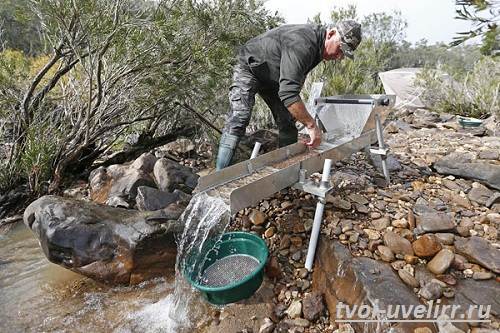
Licenses are given only for searching in the dumps of former industries, or for developing unpromising areas. Another snag is the ban on the use of heavy equipment, such as bulldozers.
A license for gold mining to a private individual is given under the conditions of his use of hand tools. You won’t be able to extract much valuable metal from technogenic placers like this.
Gold mining license price
The cost of a gold mining license depends on how you obtain it. There are a number of law firms that undertake to draw up papers for an amount from 100,000 to 200,000 thousand rubles.
The customer only pays. Hired persons fill out the documents and knock on the necessary thresholds. At the same time, they promise to get a perpetual license, and not a permit for a couple of decades.
Advertisements “ I’ll buy a gold mining license ” are not uncommon. Investments in industrial developments, on average, amount to 10-100,000,000 rubles. This is in the case of placers.
If mining is carried out from ore, 15-20,000,000 will be required, and not just rudders, but dollars. Compared to these amounts, 100-200,000 does not seem like a lot of money. At the same time, businessmen save themselves from the hassle of paperwork.
Another question is how much a gold mining license costs if you obtain it yourself. The state duty is only 7,500 rubles. They charge 10 times less for re-issuing papers.
They ask for the same amount for a duplicate document confirming the availability of state permission to use subsoil. License renewal also costs 750 rubles. The information is posted on the website of the Department of Subsoil Use of the Central Federal District.
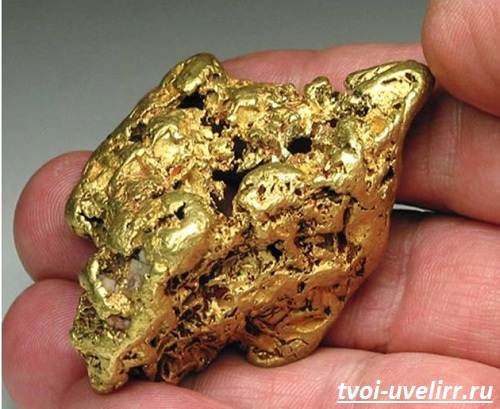
how to obtain a gold mining license . Minimum costs, as a rule, accompany organizations that received papers on a competitive basis. A competition is an alternative to the same auction. At the latter, the stakes are raised.
The competitors fight not so much for money, but for their readiness to fulfill the conditions of the customer, that is, the state. As a rule, it offers a limited list of deposits.
Most of them require additional geological exploration. The investor is obligated to carry it out, setting a tight deadline. If possible, you can save a lot on obtaining a license.
Despite the different ways to obtain a license, experts talk about 15-20 tons of illegal gold mining annually. Small miners, as a rule, bypass the law.
Previously, they were prohibited from working in principle. Now, they have allowed to use the subsoil, but under conditions that do not suit the majority of private owners. The legislation is imperfect, but the gold reserves in Russia can be called such.
Herodotus also wrote about the abundance of precious metal in the country. 15 centuries have passed since the 5th century, hundreds of new deposits have been discovered. They cannot help but attract treasure hunters. As a result, the volume of illegally mined gold accounts for more than 10% of total production.
The ban on private gold prospecting in Russia lasted for almost a century. During the Soviet era, they decided to trust the subsoil only to large organizations. After the collapse of the union, they started talking about lifting restrictions only in the 2000s.
The practice of interaction between the state and private miners outside the framework of the Criminal Code has been lost. It is necessary not only to issue licenses, but also to restore ties and trust between the federal apparatus and mere mortals.
Peter the Great once trusted them and was right. Most of the large deposits in Tsarist Russia were discovered by what today are commonly called individuals.
Legislative changes
Only in 2021, Dmitry Medvedev, delineating the next stage of liberalization in the field of gold mining, approved changes to the law “On Subsoil”. They concerned the mining of gold in Russia by individuals (2016 - new edition).
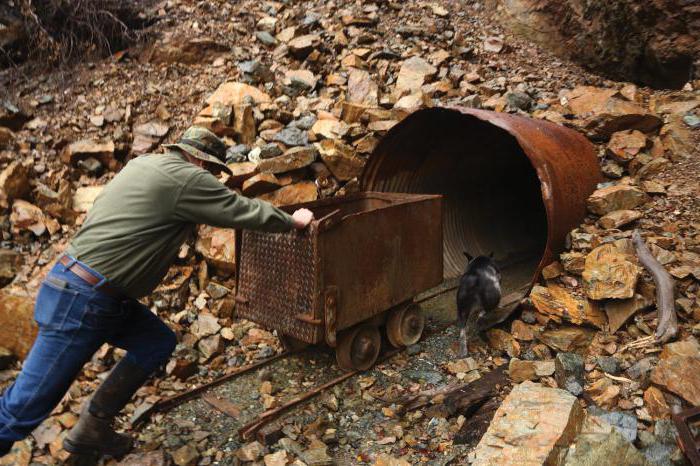
According to this legislative document, from the beginning of 2021, private gold mining in Russia was once again allowed. The law provided for the possibility of renting a land area of 0.15 square meters for a certain period of time. m, where, according to professionals, up to ten kilograms of gold can be mined. However, when mining gold, it is necessary to take into account that there are several requirements:
- metal must be obtained only by the surface method;
- It is prohibited to use explosives in work;
- You can use a layer of earth up to five meters deep.
Today, gold mining in Russia by private individuals (a license will avoid problems with the law) can result in a fine of several thousand rubles. In this case, the miner will also be left without tools purchased specifically for obtaining precious metal. And if it turns out that the suspect has gold worth more than one million rubles, there is also criminal liability. A similar case concerns the mining of a mine that is the property of a company engaged in gold mining.
Punishment for illegal mining
Mining of precious minerals is a convenient environment for criminal activity. An increase in the number of private miners can lead to an increase in banditry and corruption. And only a well-structured legal framework and strict government control can stop the illegal activities of gold miners.
Gold mining in Russia legally by private individuals can reduce the volume of illegal gold mining. A license will help you avoid problems with legislation, but according to the current Federal Law on Precious Metals, individuals are prohibited from searching for gold. Its illegal extraction may result in a fine of several thousand rubles. In addition, the prospector will lose the tool purchased to obtain the precious mineral.
If a citizen under suspicion is found to have gold worth more than 1 million rubles, he also bears criminal liability. This penalty is also established for those persons who are engaged in processing a mine owned by a company that has a gold mining permit.
Thus, after the approval of the new bill, not only legal entities, but also individuals will be able to search for gold. This will bring additional revenue to the budget, support the development of small and medium-sized businesses in the regions of the Russian Federation and create additional jobs. To obtain a license, private owners will need to register as an individual entrepreneur and submit an application to the management body of the state subsoil fund. Otherwise, working without official permission will entail criminal liability.
Positive aspects of changes to the law “On Subsoil”
Even taking into account all these facts, many believe that the adopted law has many positive consequences:
- additional revenues to the budget - it is assumed that the government will earn about 300 kg of gold annually;
- good support for strengthening small and medium-sized businesses in provincial areas;
- creation of additional jobs and increased self-employment of the population;
- growth of residents in populated areas of sparsely populated regions.
However, the increase in the number of private miners leads to the danger of increased corruption and banditry, since this is a very convenient environment for committing crimes. Strict state control and a clear legal framework can stop such a process.
The procedure for handing over the mined precious metal will be determined after the legislative and regulatory act is approved at the federal level. Later, on the ground, government officials will be able to make the necessary changes to regional legislation.
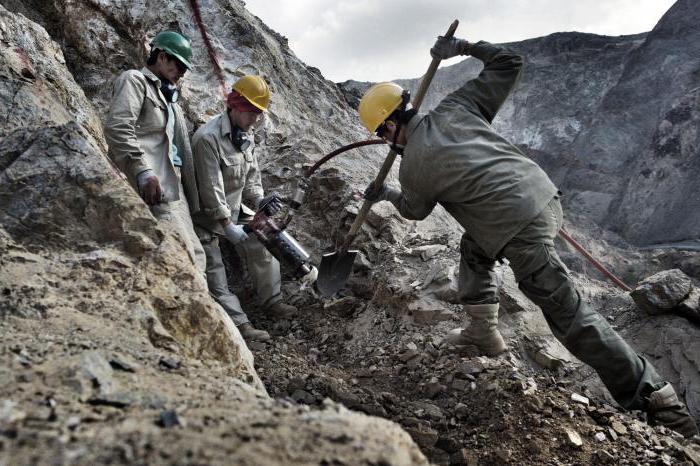
Gold mining by individual entrepreneurs
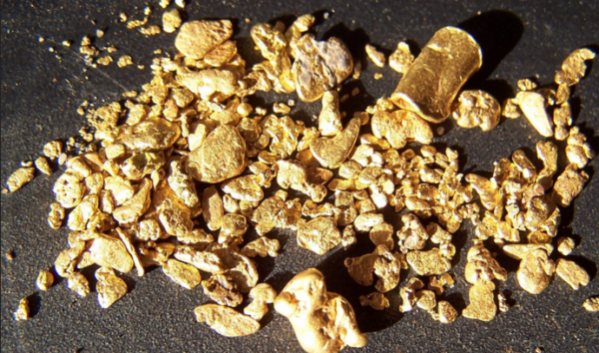
The participation of individuals in business activities related to gold mining is not legally established. The existing bill on amendments to the laws “On subsoil” and “On precious metals and precious stones” No. 429535-5, called “On the extraction of placer gold by individual entrepreneurs,” was adopted by the State Duma in 2011 only in the first reading and sent for revision. To date, the date for consideration in the second reading of the bill has not been determined, but in October 2021, a committee responsible for the further development of this law (State Duma Committee on Natural Resources, Property and Land Relations) was appointed.
This special bill provides for the following innovations:
- Gold mining can only be done in areas that are not part of industrial development. The extracted physical volume of gold in the provided area should not exceed 10 kg.
- The declarative rule for the provision of plots, competitions and auctions are not held.
- An individual must be registered as an individual entrepreneur.
- Development of the IP site will be possible based on the decision of the territorial body with the issuance of a license for a period of 5 years.
This important law, if adopted, could bring additional revenue to the budget, promote the development of small and medium-sized businesses in the regions of the country, create new jobs and increase the number of self-employed people. Private gold mining within the framework of the law will definitely reduce the volume of illegal mining.


